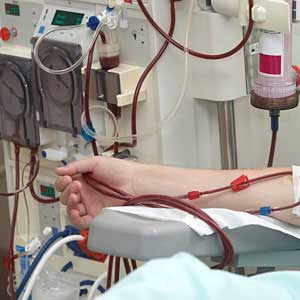Hemodialysis in Vijayawada
Hemodialysis is a treatment that is done to filter the wastes and water from your blood, as your kidneys did when they were healthy. Hemodialysis assists in controlling with blood pressure and equalise significant minerals, like potassium, sodium, and calcium, in your blood.
Hemodialysis can help you feel better and live longer, however it's not a cure but a solution for kidney failure.
Why it's done?
Your doctor will help decide when you ought to begin hemodialysis based upon a few factors that includes:
- Overall wellbeing
- Kidney function
- Signs and symptoms
- Individual preferences
- Quality of life

Procedure
At the time of treatment, you sit or recline in a chair while your blood flows through the dialyzer ―a filter that behaves as an artificial kidney to clean your blood. You can utilize an opportunity to sit in front of the TV or a movie, read, nap, or perhaps converse with your "neighbors" at the center. If you get hemodialysis at night, you can sleep during the procedure.
- Preparation: Your weight, blood pressure, heartbeat and temperature are checked. The skin covering your access site — where blood leaves and afterward reenters your body during treatment — is cleansed.
- Beginning. During hemodialysis, 2 needles are placed into your arm through the entry site and taped in place to remain secure. Each needle is connected to an adaptable plastic tube that interfaces with a dialyzer. Through one tube, the dialyzer filters your blood a few ounces at a time, enabling the wastes and extra fluids to pass from your blood into a cleansing fluid called dialysate. The filtered blood gets back to your body through the subsequent tube.
- Symptoms: You might experience nausea and abdominal cramps as excess fluid is pulled from your body — particularly if you have acquired a significant amount of fluid in between dialysis sessions. If you are not comfortable at the time of procedure, get some information about reducing the side effects by such measures as changing the speed of your hemodialysis, your prescription or your hemodialysis fluids.
- Monitoring: Since blood pressure and pulse can vacillate as excess fluid is drawn from your body, your pulse and blood pressure will be checked several times during every treatment.
- Finishing: At the point when hemodialysis is completed, the needles are taken out from your access site and a pressure dressing is applied to the site to prevent bleeding. Your weight might be recorded once more. Then, at that point, you're free to approach your usual activities until your next session.
What are the advantages of Hemodialysis?
The advantages of hemodialysis include:
- The nurses perform treatments for the patient
- Regular contact with other hemodialysis patients and staff
- Patients generally just have 3 treatments each week; allowing them four days off
- No equipment or supplies must be kept at home
- In a emergency, clinical assistance is available rapidly
Get the best treatment at dialysis hospital from Dr. Anvesh Golla nephrologist in Vijayawada who is proficient in providing the patients with clinical expertise, high ethical standards and latest medical equipment.
Make an appointment with nephrologist for Hemoperfusion For Poisoning in Vijayawada
